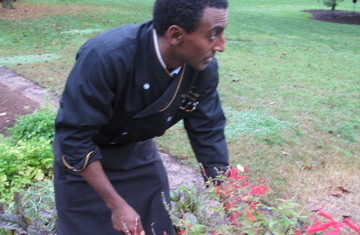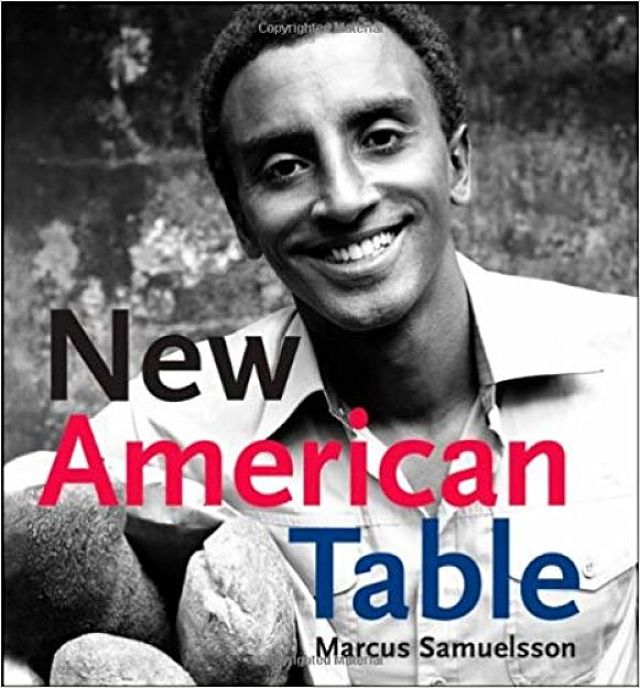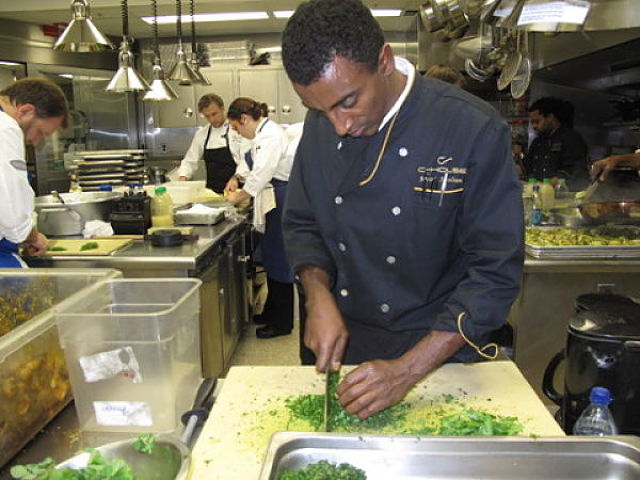 Marcus, pictured here in the White House garden, was selected to prepare the Obamas' first State dinner. (Courtesy photo).
Marcus, pictured here in the White House garden, was selected to prepare the Obamas' first State dinner. (Courtesy photo).
Tadias Magazine
By Tseday Alehegn

Published: Tuesday, December 15, 2009
New York (TADIAS) – It has been a busy year for Marcus Samuelsson. A few weeks after the release of his book New American Table, Samuelsson was invited by the White House to prepare the Administration’s first State Dinner honoring the Prime Minister of India.
“It was an honor for me not only to be asked but also to do it,” Samuelsson tells Tadias.
Samuelsson says he was primarily thinking of diversity while preparing the State Dinner assisted by ten members of his own staff. “I tried to think of diversity on different levels, not just the food,” he tells us.
Below is our interview with Marcus Samuelsson about the White House State Dinner, his new book, and living in Harlem.
Tadias: When did you begin thinking about writing New American Table?
Marcus: I began working on the book in my head around 2004/2005, right around the time I became an American citizen. I really started to think about diversity. How do I explain Ethiopian heritage? How do I define my Swedish heritage? I am privileged to be in America where I can actually be Ethiopian, Swedish, and American. And as Maya and I got more and more together we started thinking about how to keep our identities through food. And not only that but I realized that all my friends are immigrants. It’s Jewish people marrying Arabs, Pakistanis marrying Germans, Latin people marrying Swedish people. And all of them are keeping their food heritage. And more so than language, it’s through food that they are keeping their identities. Food is a celebration of diversity in America. I don’t know any other nation where you could keep all these cultures alive and on top of everything you are also American. And I thought that it was really cool. There is also the recognition of the growth of immigration. Think about how Ethiopians came to this country. In cities now we have on average about six or seven Ethiopian restaurants. That’s incredible. And it’s a way for us to keep our identity. And it’s not only the Ethiopian community that I’m talking about. I’m talking about Vietnamese community in Minneapolis, Latin community in Chicago, Nigerian community in Boston. We know it’s Latin in Los Angeles and Texas and so on. Those are the obvious ones, but I’m talking about the not-so-obvious diversity; the Koreans in New Jersey, Middle Easterners in Detroit.
I always write. I always take notes wherever I am. Food is my language. I cook with friends, I cook in the restaurants, for magazines. I always write and connect my recipes to my outlets. My creativity goes with the diversity. I didn’t want to make a narcissistic book about me, but about everyday people. That’s why I do the collages in the book. The book only works if it’s about the everyday person, the New American. Everyone from kids to the elderly can recount stories of food. Whether it’s stories from the Second World War or stories about leaving Ethiopia, or stories about leaving Sweden, they are all stories about us.
The other thing to note is the enormous Farmers’ Market boom. I wanted to include this in the book. When I came to New York you could barely buy cheese or great bread. Now you have a resurgence of artisanal food makers, and I wanted to touch on that. People are going back to ‘local’ to ‘organic’ to ‘seasonal.’ I wanted to celebrate that. We are slowly going in a greener direction. And that’s the conversation about food that I want to keep having. I’ve already written a book about restaurants. I’ve done that. Going forward it will have to be about people, and how people inspire me. I’m not a politician, I’m a chef, and so I tell my stories through food. Like an artist’s paintings would show what he’s going through or what he’s reflecting on.
Tadias: When was the moment, during your work or travels, where you felt that what you were experiencing should become a book?
Marcus: I’ve been American for a while now and in the beginning of the book I talk about becoming American. As a Black person I wanted to come to America rather than stay in Europe because there are more opportunities here as a person of color. I think a lot of people can relate to that feeling. Of course you have doubts and you don’t know if it’s going to work out, but you work hard and it will. This book was also written at a very particular time. This was written post 9-11, in the middle of the Iraq/Afghanistan war, very patriotic stuff. I feel that sometimes the image of America in the rest of the world is not that great, but I feel that diversity, food, these are things that we are getting right. These are things that we can be inspired by. This book was written in a time of transition. I began writing in the Bush era and the book is out in the Obama era.
Tadias: Can you share one or two of the untold stories behind the food that you describe in New American Table?
Marcus: There’s a couple, friends of mine. She’s Pilipino and he’s Swedish and African-American. Every year they have a dinner where when you go to their house they have about 25 different dishes. And the food is from Black culture, Pilipino culture, Swedish culture. And they’re not chefs. That’s inspiration. Their friends are just as diverse, from Ethiopia to France. This is the diverse food life that I wanted to live, and now I’m living it. You know even when Maya cooks Doro Wat and our friends who are not Ethiopian are enjoying the dish, what are we doing? We’re telling a story about Ethiopia. So all of us who are Ethiopian-American are actually ambassadors for our own country. There is an exchange of culture here but we’re not asking you to change your religion or faith or beliefs. We are simply the culture and we are sharing the food. So we’re shifting the dialogue to something positive, something tangible.
Tadias: Looking back at the history of food in America and the traditional American dining table, how would you describe it now?
Marcus: Well this is an evolution. We were very much England/Europe-inspired for a long time. And now you’d hear someone say “Hey I had sushi last night, and I had Ethiopian the night before.” So you’ve gone a complete 180. We’re completely embracing diversity through the food, and before we were taught to hide it. So it is a sense of arrival to say “I had sushi, I just tried a Moroccan restaurant, I had Indian the day before.” Even in cooking the State Dinner we were cooking an ethnic meal at an American State Dinner.
Tadias: How was the experience of preparing the White House State Dinner?
Marcus: It was the highest honor. That was Barack Obama’s first State Dinner so it was extremely important for him. And it was an honor for me not only to be asked but also to do it. Michelle wanted a vegetarian dinner as much as possible as Mr. Singh is vegetarian so we came with fresh but very humble ingredients. These were not the ‘best dishes of Marcus Samuelsson.’ For me, when I did the State Dinner I wanted to show the best of America and the best of India. I also wanted to show the White House as someone’s home. Therefore we introduced a bread course, where we broke bread and had both corn bread and naan bread, which they’d never had at a State Dinner before. It was the first time that all fresh ingredients and herbs were supplied from the White House garden. We had lentil soup, which was very Indian for me, but we also had American seasonal apples. The dumplings and green curry prawns were Indian but we also served All-American dessert, Pumpkin Pie, and we served All-American wine. So it was a complete marriage for me looking at both cultures. The smoked collard greens served were from African American culture. Why not serve that as a testament of diversity instead of making the best possible Foie gras that you could do? I also brought my staff, half of them were girls and half were guys. Some were African-American, some of them were Jewish, so I tried to think of diversity on different levels, not just the food.

Cover of Marcus Samuelsson’s book ‘New American Table.’ (Courtesy photo)

Marcus at the White House kitchen chopping herbs that he picked from the White House garden in preparation for the Obamas’ first State dinner. (Courtesy photo)
Tadias: How many staff did you take with you?
I brought 10 with me.
Tadias: So what are your next steps? What’s in the horizon? What kind of ventures are you thinking of now?
Marcus: Moving forward, I’m thinking, “What can I do in Harlem?” I’m thinking about public school and food. I’d also like to bring more Farmers’ Markets to Harlem. I live in Harlem and I go in stores and there are no green vegetables in the market. You can go to any market in Ethiopia regardless of income and you can get local eggs and organic. Here, if you don’t have money you eat poorly. It’s one of the only countries where low income and eating poorly is connected. I would like to change that. At least I would like to raise awareness by cooking in the community, or definitely enabling people with low income to have better choices when it comes to food. So those are the kinds of things that I care about.
Tadias: What do you like most about Harlem?
Marcus: Harlem? I always wanted to live in Harlem. Harlem was the community that I knew about when I was in Sweden. It was what I knew about America and African-American culture. I’ve always thought about Harlem. And I also think that if Harlem’s going to change then people like myself and others should stop talking about Harlem and move to Harlem. Harlem is not going to change because we talk about it. It’s going to change because we do something. And I put my money in the economy. For me it’s not a PR stint. For me it’s a lifestyle. I sold my place and moved to Harlem to experience it. And I can’t write about an experience without having lived it. When I shop at C-Town, for example, it’s not because I’m happy to shop there, it’s because I want to have the same experience that the person who lives in this community has. When Maya wants to go to Whole Foods or somewhere else, I say, “Well we can do that too but we also have to buy from here as well because we gotta know what the hell we’re talking about.”
Tadias: Any other thing you’d like to add?
Marcus: I look forward to going to Ethiopia for New Year’s and I look forward to eventually have a cooking school in Ethiopia. To have a hospitality school in Ethiopia – that’s my ultimate goal. I’ve experienced a lot of stuff, and it’s also my job to give back and to challenge people who have money to contribute. It will bring a different dialogue. It’s like what bringing Lucy here does – it starts a dialogue. Same thing with the Discovery Show about the oldest human being, or what Ras does with his film, ‘The Athlete’ when he narrates the story from an Ethiopian perspective. It’s what you guys do; it’s bringing a different view, which is incredible. It’s important to keep producing, keep writing. Even what Maya does; she’s in Korea right now doing a shoot for Olympus Camera. For other people to see that that’s possible is incredible. I’m in awe of all that. I also love one of the pieces that you wrote about Ethiopians that have done stuff in America, because you do exactly what I think about a lot – to inspire to aspire. You read that article, and if you’re not in that article, you want to get in that article. It’s fantastic. It’s inspiring. Regardless of who it is, it’s more about the message.
—
Tseday Alehegn is the Editor-in-Chief of Tadias Magazine.
Join the conversation on Twitter and Facebook.


























Great interview Tseday Alehegn. Marcus is doing such a good job and so are you guys at Tadias. As a mother of 6-year old Ethiopian daughter, I think Marcus is a fabulous role model, not only to Ethiopians but to everyone really. I will pick up his book tomorrow. Thank you again.
Very inspiring. Congratulations Marcus! This was a great opportunity and let god be with you and your future dreams, including opening cooking school in Ethiopia.
This interview is really inspirational, especially the last paragraph really spoke to me personally. Hope Tadias will have the same interview with Ras on his movie the “Athletu” soon.
Thank you
I enjoyed this interview. Tadias, you guys are my neighbors here in Harlem. I appreciate you so much in your efforts to highlight not only Ethiopian Americans but your historic neighborhood, Harlem. We are proud of you and we are proud of Marcus and we look forward to his project in Harlem. Please keep us posted.
Bless
Greg and Tina
Thanks Tadias, inspirational indeed! & all the best to Marcus!
Wish you all the best Tadias and Marcus!
Dear Marcus,
I am an Ethiopian and I am very proud of you and of what you are doing. You are respected, loved, and admired in your profession. You are charismatic,polite and professional, and I am sure all Ethiopians are proud of you, and many young Ethiopians will follow your foot-steps. What I see in you is a reflection of the combination of professionalism, Swedish humulity, and the Ethiopian spirit of generiosity.
Americans have a special heart for Ethiopians, and we should all thank them for showing it in your success. Thanks to our deep tradition, Ethiopians are quiet, polite, and generous, and you should be thanked for reinforcing these values at a time when such enforecemts are required.
May you continue being a source of pride!